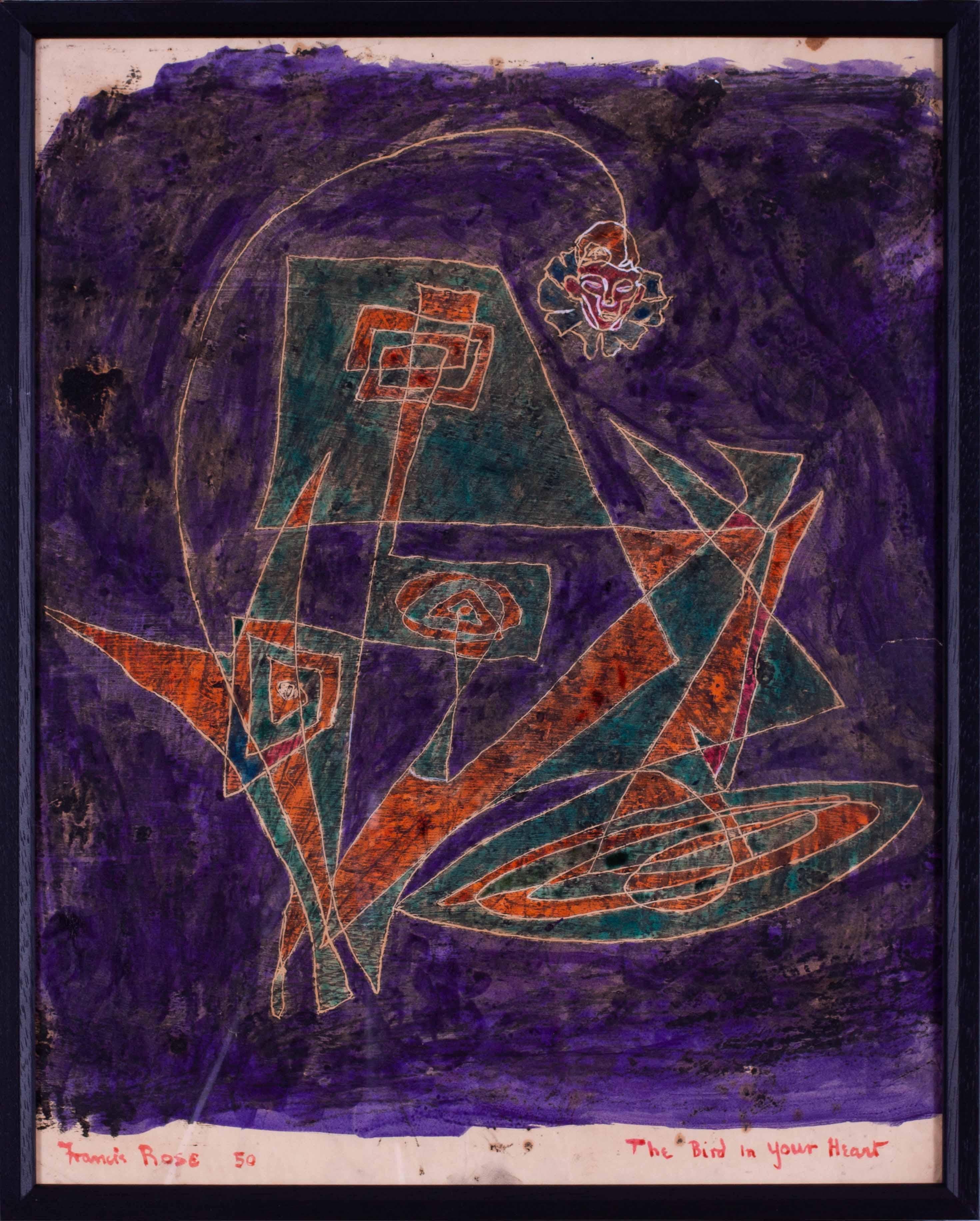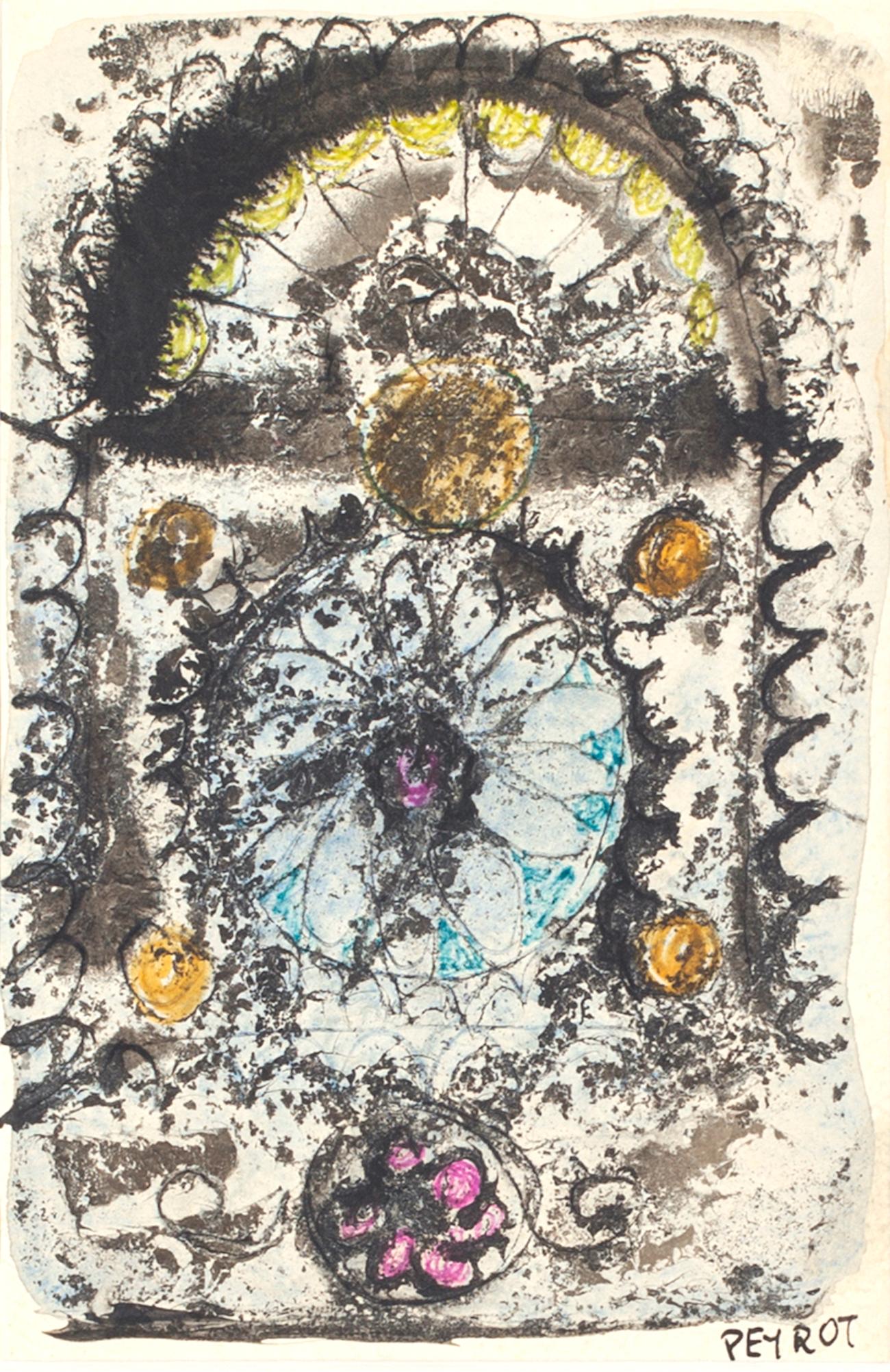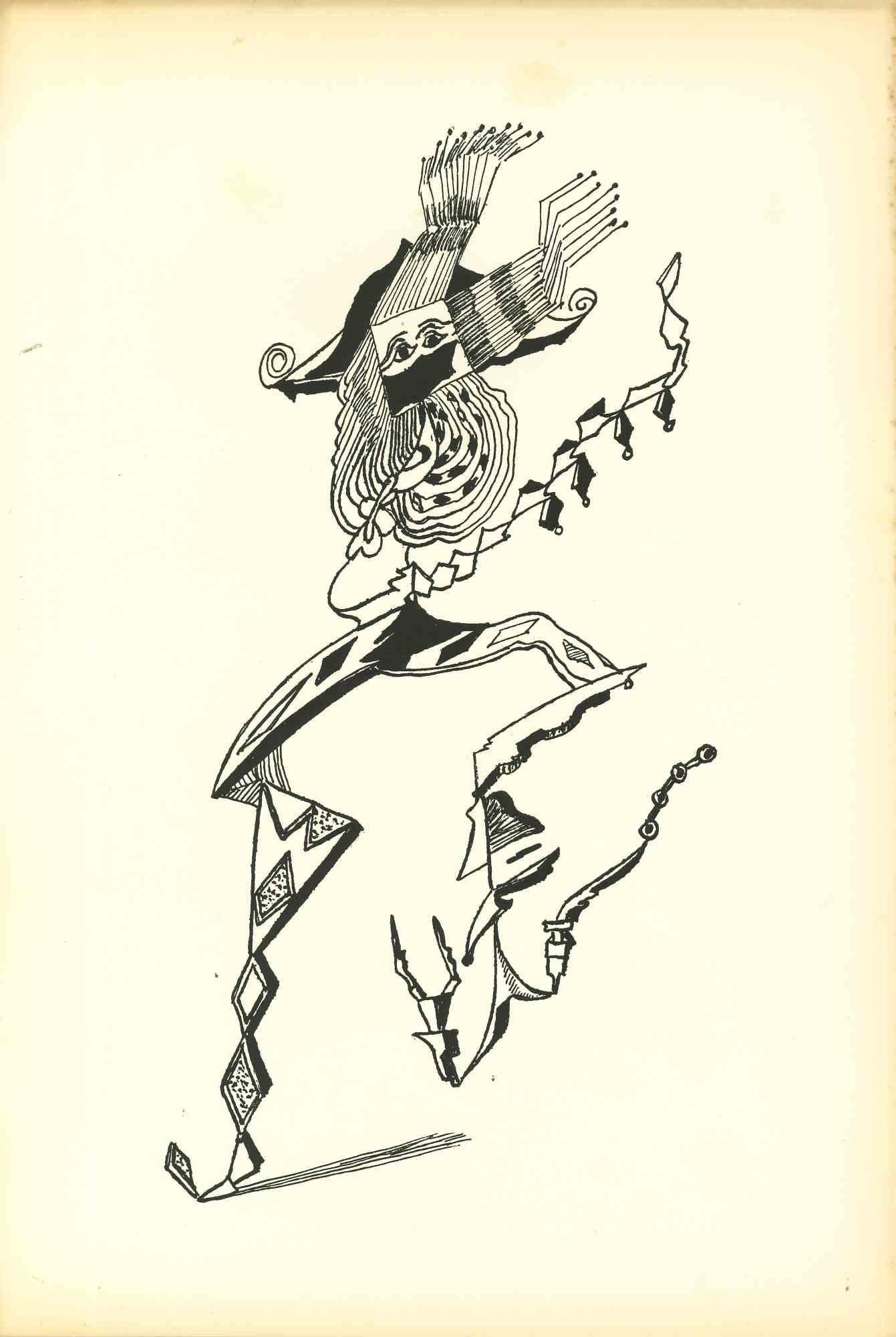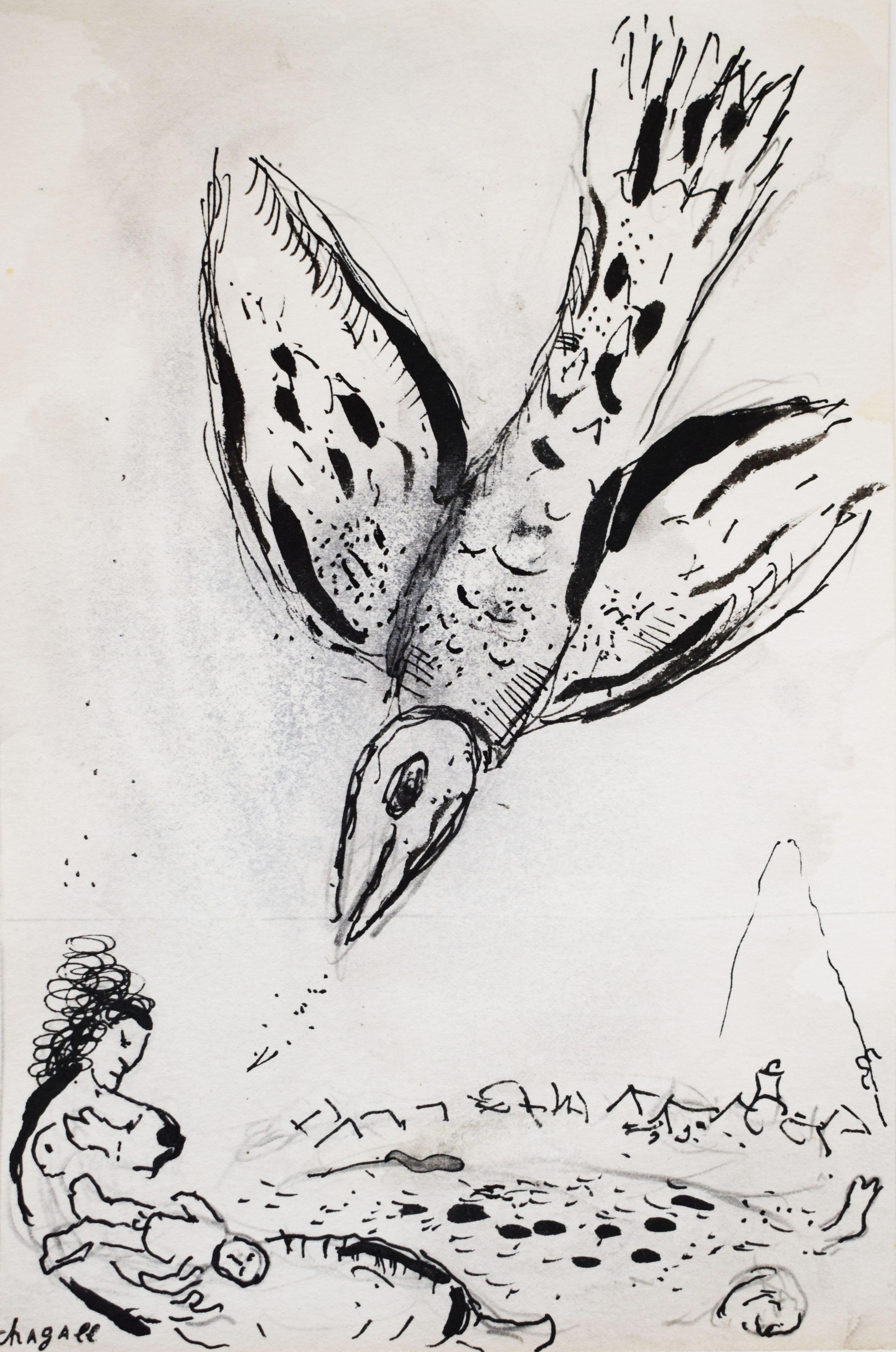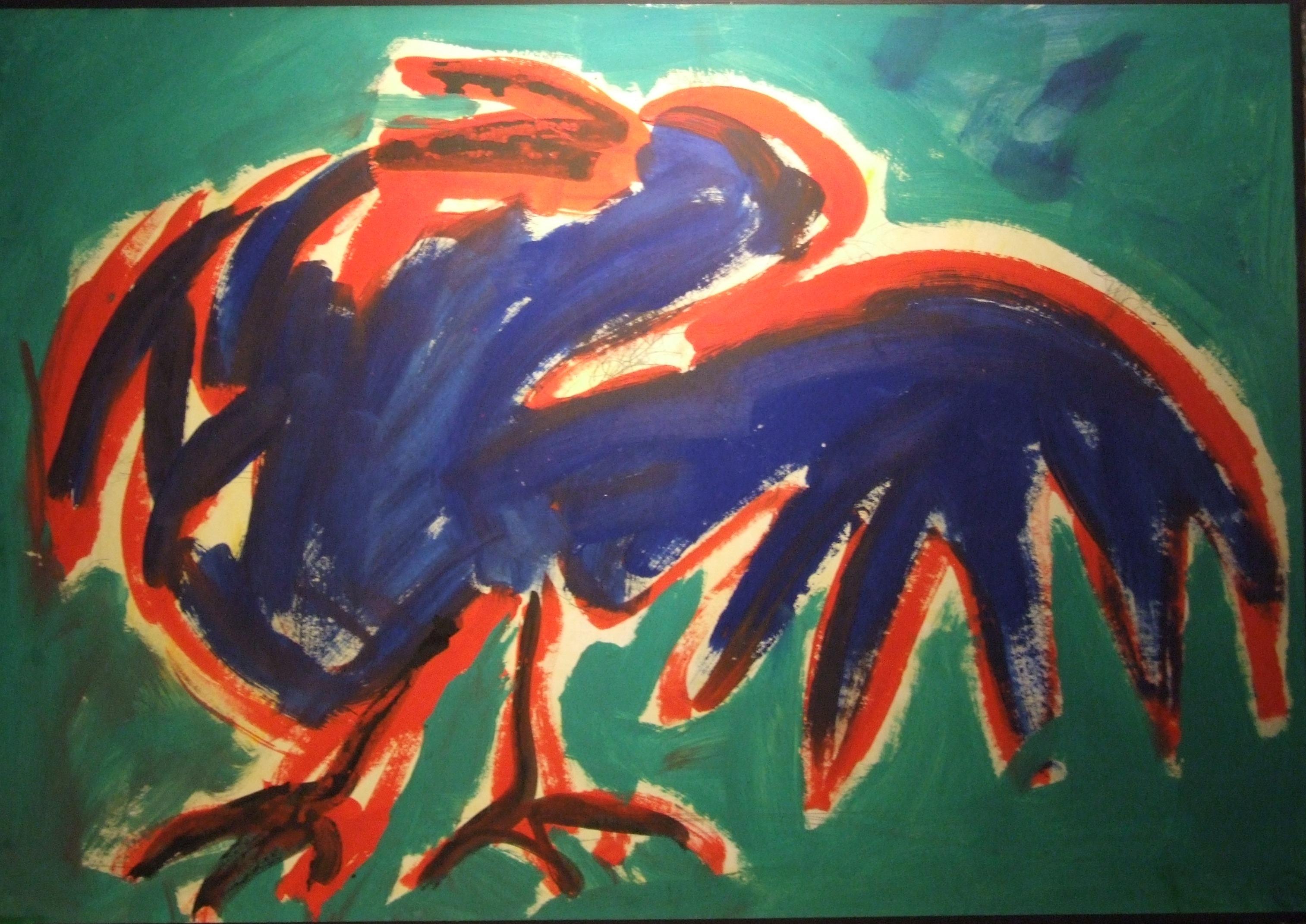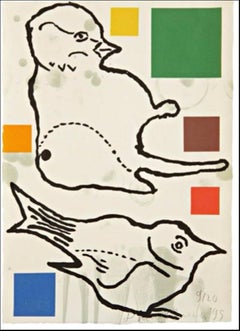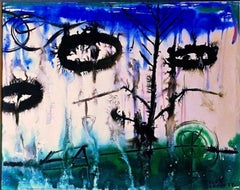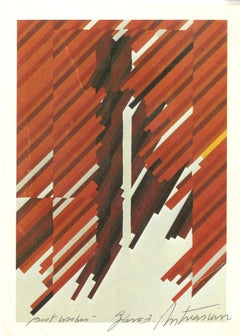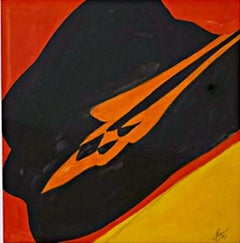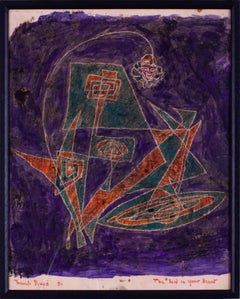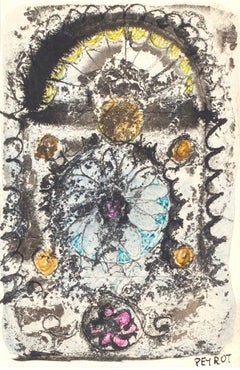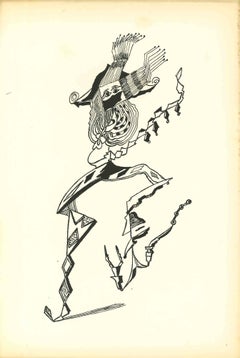Items Similar to Lyre Bird (Design for the cover of Poetry London), 1943, Ink, gouache and pastel
Want more images or videos?
Request additional images or videos from the seller
1 of 11
Ceri RichardsLyre Bird (Design for the cover of Poetry London), 1943, Ink, gouache and pastel1943
1943
$10,000
£7,556.40
€8,745.90
CA$14,029.51
A$15,604.84
CHF 8,186.28
MX$190,414.47
NOK 102,748.10
SEK 96,827.62
DKK 65,284.43
About the Item
Ceri Richards
Lyre Bird (Design for the cover of Poetry London), 1943
Ink, gouache and pastel on paper
Bears original Jonathan Clark & Co. label on the back of the frame
Unique
Frame included
Unique mixed media ink, gouache and pastel on paper work (not signed)
Provenance:
Jonathan Clark Fine Art, London (with original label verso, and accompanied by original exhibition catalogue)
This exquisite work of art is the design for the cover of Poetry London Magazine 1943
It was also featured in the 2010 exhibition "Ceri Richards The Poetic Imagination" at Jonathan Clark & Co, London
This work is featured in the lavishly illustrated softcover catalogue that accompanied the eponymous exhibition, and is reproduced in the catalogue as the frontispiece. (see images).
This elegant exhibition catalogue will accompany this work
This work is held in a stylish gilt painted wood frame under fresh UV plexiglass, bearing the original Jonathan Clark & Co. label on the back for provenance.
Measurements:
Framed
17.5 inches vertical by 15 inches by 2 inches
Artwork:
10.75 inches by 7.7 inches
CERI RICHARDS BIOGRAPHY
Like so many greats of the art world, the story of Ceri Richards is one of unrecognized accomplishment and neglected genius. Though he represented Britain at the 1962 Venice Biennale, was himself represented by the Marlborough gallery alongside friends and contemporaries John Piper and Francis Bacon, and was described by Henry Moore, his one-time tutor, as the finest draughtsman of his generation and an artist of unique creative and imaginative gifts and achievements, Richards’ reputation as one of finest British artists of the 20th century has since fallen through the cracks. Born to a working-class Welsh family in 1903, Richards’ early life was spent surrounded by art, music, poetry, and song. Congregations in the local chapel first introduced the young artist to iconography and the sounds of the choir; a talented pianist (When I look into the mirror, he once remarked, Beethoven looks back at me), by his teenage years he was accompanying them at services. From his father, an amateur poet who would recite Welsh verses in the family home, he also developed a love of poetry that would heavily influence much of his later work. As a young child at school he drew incessantly, his future promise heralded by prizes at local art competitions. Leaving school to apprentice with a firm of electricians in Swansea, his evenings he spent studying engineering draughtsmanship at Swansea College of Technology and life drawing at the Swansea College of Art, eventually enrolling at the latter full-time. By the end of his course in 1924, his mind was made up: the life of an artist was his calling; the 200-mile journey from sleepy Dunvant to the Royal College of Art in London would be his pilgrimage. Supported by a hard-earned scholarship, the Royal College soon became Richards’ educational temple, introducing him to a host of new influences that the artist sustained throughout his career. It was here that he first began his love affair with modern European painting – Ernst, Matisse, and especially Picasso became favourites – and began to paint seriously himself. Intelligent and emotionally attuned, he got on well with his tutors who also first introduced him to the many print techniques he would exploit in later years. Graduating from the college in 1927, in the 1930s Richards began to exhibit his first public work, surreal, semi-abstract paintings and boxed constructions inspired, amongst others, by the sculpture of Jean Arp. Placed besides prominent works of the Surrealist movement, they hold up to that period’s most important sculptures and canvases, possessing a lyrical and romantic quality that was conspicuously lacking from contemporary Surrealists and that would remain a hallmark of his work for years to come. With the outbreak of war, Richards sought out work as a teacher, being appointed as the head of painting at the Cardiff School of Art until 1944 before moving back to London. The next ten years were spent developing an ever deeper and more personal vision within his art, one informed by the varied themes of nature, and visual expressions of music and the words of poetry.
With these complimentary branches of the arts he felt a profound affiliation that traced its roots back to his early upbringing, something he expressed a number of times in interviews and his own writing: One can generally say that all artists — poets, musicians, painters, are creating in their own idioms, metaphors for the nature of existence, for the secrets of our time. We are all moved by the beauty and revelation in their utterances — we notice the direction and beauty of the paths they indicate for us, and move towards them. Of the many musical and poetic muses in his career – Beethoven, whom he depicted as a Promethean thief of creative fire, or Debussy, whose music soothed the angst-ridden exercise of painting – Dylan Thomas was amongst the most influential and important. Though they met only once, in Thomas’ poetry Richards found not just the kindred sounds of a native Welshman, but an unspoken affinity for the natural world which both saw as a constant cycle of love and death. One story tells of how on the evening of November 8th, 1958, awoken in a hot sweat and unable to sleep, Richards got up and sketched through the hours of the early morning, inspired by Thomas’ radio play Under Milk Wood. The very next day, the wireless brought news of Thomas’ death. Richards’ sketches would form the basis of his illustrations for the 1972 Folio edition of Thomas’ play, published a year after Richards’ own death which fell, unbelievably, on the very same day as Thomas’ some 18 years later. From the late 1950s until the end of his life Richards was closely involved with the renowned Curwen Press, for whom he made a number of exquisite lithographs demonstrating the supreme draughtsmanship he had refined all those years ago and which had underpinned the paintings and prints ever since. By now acknowledged as one of Britain’s most important living artists, with Marlborough exhibitions and a retrospective at the famous Whitechapel gallery, he was elected to represent the country at the 1962 Venice Biennale, from which he returned a triumphant prizewinner. While all signs pointed to a glittering reputation that would see Richards join the likes of Moore, Sutherland, and Bacon in the vanguard of British art, after his death in 1971 he was instead quickly and quietly forgotten. The eclecticism and eccentricism for which he is today celebrated ironically saw his name ignored at the time in favour of artists whose work was more easily defined. But it is that poetic vision which characterized his work, argued Roberto Sanesi, the Italian poet, critic, and translator with whom Richards worked and who has since championed his achievements, that makes his art so compelling: [Ceri] seemed to want to gather every aspect of nature into his painting at once: the whole of the swarming earth in all its manifestations and mutations — its deep subterranean magic, its inorganic strata as well as its organic layers, the green world of plants and the world of man… It is a whole world of pity, passion and violence: pages written in sweat that disclose petals and corpses, rainbows and moon, Celtic crosses, flowers and landscapes germinating out of opened hands, limbs outstretched to the sky in gestures of abandon, communion and offering…Though some little work has been done to redress the situation, including a major retrospective at the Tate in 1981, Ceri Richards remains a name unfairly unremembered in the art world. Thankfully, as Richards’ expert Mel Gooding has described, the power and poignancy of his images endures today: in the act of drawing waves of water and manuscript leaves, [he could] transform the natural world into an imagining, a poem, a print, a work that survives its maker.
-Courtesy Goldmark
- Creator:Ceri Richards (1903 - 1971, British)
- Creation Year:1943
- Dimensions:Height: 17.5 in (44.45 cm)Width: 15 in (38.1 cm)Depth: 2 in (5.08 cm)
- Medium:
- Movement & Style:
- Period:
- Condition:Very good original condition with no apparent issues.
- Gallery Location:New York, NY
- Reference Number:1stDibs: LU1745215795862
About the Seller
5.0
Platinum Seller
Premium sellers with a 4.7+ rating and 24-hour response times
Established in 2007
1stDibs seller since 2022
448 sales on 1stDibs
Typical response time: 2 hours
- ShippingRetrieving quote...Shipping from: New York, NY
- Return Policy
Authenticity Guarantee
In the unlikely event there’s an issue with an item’s authenticity, contact us within 1 year for a full refund. DetailsMoney-Back Guarantee
If your item is not as described, is damaged in transit, or does not arrive, contact us within 7 days for a full refund. Details24-Hour Cancellation
You have a 24-hour grace period in which to reconsider your purchase, with no questions asked.Vetted Professional Sellers
Our world-class sellers must adhere to strict standards for service and quality, maintaining the integrity of our listings.Price-Match Guarantee
If you find that a seller listed the same item for a lower price elsewhere, we’ll match it.Trusted Global Delivery
Our best-in-class carrier network provides specialized shipping options worldwide, including custom delivery.More From This Seller
View AllDonald Baechler, Birds, lithograph, signed/N, 9/20 from Fish & Wildlife Series
By Donald Baechler
Located in New York, NY
DONALD BAECHLER
Birds, 1995
Lithograph on wove paper
11 63/100 × 7 47/50 inches
Hand signed, dated and numbered 9/20 on the front; bears the publishers' blind stamp lower left
Publis...
Category
1990s Pop Art Abstract Prints
Materials
Lithograph
Untitled Abstract Expressionist painting on paper mid century modern art
By Rolph Scarlett
Located in New York, NY
Rolph Scarlett
Untitled Abstract Expressionist Painting, ca. 1960
Gouache, Ink, Watercolor on Paper . Hand signed, with original Jonas Aarons Gallery label
23 × 18 3/4 inches
Signed ...
Category
Mid-20th Century Abstract Expressionist Abstract Drawings and Watercolors
Materials
Watercolor, Gouache
Rare vintage hand signed gallery invitation card by master lithographer - 1970s
Located in New York, NY
Garo Antreasian (Hand Signed & Inscribed), 1978
Offset lithograph invitation card. Hand signed & inscribed
7 3/4 × 5 1/2 in 19.7 × 14 cmublisher
Published by Alice Simsar Gallery
Ra...
Category
1970s Abstract Abstract Prints
Materials
Ink, Lithograph, Offset
Study #26, 1960s Gouache painting Signed Framed Pace & Hudson Gallery provenance
By Jack Youngerman
Located in New York, NY
Jack Youngerman
Untitled Study #26, 1967
Gouache painting on paper (with original JL Hudson and PACE Gallery labels)
Hand signed and dated '67 on the front; J.L. Hudson Gallery Label on Verso.
Unique Abstract Expressionist work on paper
Frame included
Framed
Measurements:
Framed:
15 inches by 15 inches by 1.5 inch
Artwork:
7.75 inches by 7.5 inches
Provenance
From the estate of Anne Markley Spivak
J. L. Hudson Gallery Label affixed to verso (back).
The J.L. Hudson Gallery, Detroit, Michigan
This 1967 unique, signed gouache painting by renowned abstract expressionist painter Jack Youngerman was acquired from the estate of Anne Markley Spivak. It is held in the original vintage metal frame with the original J.L. Hudson Gallery label, as well as the PACE gallery label on the verso
The artwork has been newly loated and framed in a museum quality white wood frame; the original labels from the original back board have been affixed to the back to preserve provenance.
Jack Youngerman Biography
Jack Youngerman was born in St. Louis, Missouri on March 25, 1926. He moved to Louisville, Kentucky in 1929 and studied at the University of Missouri, Columbia from 1944 to 1946 under a wartime navy training program. He graduated from the University of North Carolina Chapel Hill in 1947 and, that same year, he returned to Missouri to finish his Bachelor’s degree in Journalism before moving to Paris on a G.I. scholarship.
In Paris, Youngerman enrolled at the Ecole des Beaux-Arts, studying drawing with Jean Souverbie. He explored Paris, taking in the cathedrals, museums, and history in order to grasp a greater sense of art history. He also traveled to the Netherlands, Spain, Belgium, Italy, and Greece on fine art excursions.
In 1948, Youngerman became friends with Ellsworth Kelly, Eduardo Paolozzi, and Cesar – fellow students at Ecole des Beaux-Arts. He married Delphine Seyrig in 1950, and later that year he had his first group exhibition at Galerie Maeght in Paris. He visited the studios of Constantín Brancusi and Jean Arp and became heavily influenced by the organic forms present in their work. He also met artist Alexander Calder through his father-in-law, Henri Seyrig, and experimental filmmaker and artist, Robert Breer...
Category
1960s Abstract Expressionist Abstract Paintings
Materials
Gouache
Study for Pacific Bird Sculpture, Crayon on paper, signed, Marlborough-Gerson
By Seymour Lipton
Located in New York, NY
Seymour Lipton
Study for Pacific Bird Sculpture, 1965
Crayon on paper (Hand Signed & Dated, in Kulicke Frame w/Marlborough-Gerson gallery label)
Signed and dated on center right rect...
Category
Mid-20th Century Abstract Expressionist Abstract Drawings and Watercolors
Materials
Crayon
Ron Gorchov Mid Century Modern Abstract Expressionist painting on paper Signed
By Ron Gorchov
Located in New York, NY
Ron Gorchov
Untitled early 1960s Abstract Expressionist work, 1962
Ink and watercolor painting on paper
Signed and dated in black ink lower left recto
Frame included:
elegantly floa...
Category
1960s Abstract Expressionist Abstract Drawings and Watercolors
Materials
Ink, Watercolor
You May Also Like
The Bird in your heart by British born artist Frances Cyril Stanley Rose, 1950
Located in Petworth, West Sussex
Frances Cyril Stanley Rose (British, 1909 – 1979)
The bird in your heart
Coloured ink
Signed, inscribed and dated ‘Francis Rose 50 A Bird in your heart’ (lower edge)
18.1/2 x 14.1/2i...
Category
20th Century Abstract Abstract Drawings and Watercolors
Materials
Ink
Poetry of the bird, surrealist drawing, 1948
Located in PARIS, FR
Joséphine Beaudouin (1909-2005)
Poetry of the Bird, surrealist painting, 1948
Oil on canvas
Signed "Joséphine Beaudouin" and dated "1948" lower left
13,7 x 10,6 inch
Born in Albi in 1909, Josephine Beaudouin (née Cals) showed an early interest in drawing. At the age of twelve, she moved to Paris where her mother, Jeanne Ramel-Cals, ran a literary salon that was frequented by art world figures such as Ambroise Vollard. In 1925, while her first drawings appeared in the magazine Crapouillot, the young artist entered the School of Decorative Arts where she studied fresco painting. She married the architect Eugène Beaudouin in 1928, with whom she traveled throughout Europe. Beaudouin, a member of the Académie des Beaux-Arts, designed a series of buildings that were precursors of modern architecture in France (Clichy, Maison du Peuple; Antony, Résidence universitaire Jean Zay). Josephine Beaudouin exhibited at the Salon des Indépendants, the Salon des Tuileries, the Salon d'Automne and the Salon des Artistes Décorateurs.
The work of the one that Jean Cocteau described as "bewitching" is full of mystery. Her work bears the stamp of an extraordinary personality. Indeed, Josephine Beaudouin developed a penchant for dreams at a very early age and took refuge in the works illustrated by Gustave Doré. Her technical virtuosity and overflowing imagination were praised by the critics of her time who unanimously greeted her Marmorées (ill.1). Named by René Barotte, these are paintings made on marble slabs from 1955. The artist exploits the infinite resources of the veins of this support which inspires him poetic compositions with unusual subjects. Marked by surrealism, she returns to the fantastic by delivering a prodigious creation of the mind made of dreamed cities and trompe-l'oeil.
The 1948 painting that we propose probably represents a red-billed chough. The bird is a recurring theme in the work of Josephine Beaudouin, as in her life. An avid ornithologist, she kept an aviary in her Parisian home where many island birds were kept. She also built up a collection of stuffed birds. Still on this theme, the writer Claude Aveline (1901-1992), author of the poem L'Oiseau-Qui-N'Existe-Pas, invited several visual artists to freely interpret what this bird could be. The first series of works was produced between 1956 and 1963. In 1957, Joséphine Beaudouin delivered a work with a pen of great finesse, now preserved at the Centre Pompidou (ill.2). Several renowned artists also responded to the invitation of the poet such as Jean Cocteau and Ossip Zadkine.
The precision of the graphics of our painting testifies to an attentive observation of the anatomy of the birds. The artist paints with great delicacy: the technique is impeccable, the drawing is careful, the material is smooth, the details are represented with great finesse and mastery.
Bibliography :
Fernand Pouillon...
Category
1940s Surrealist Figurative Paintings
Materials
Oil, Canvas
Composition - Original China Ink and Watercolor by A. Peyrot - 1950s
By Arturo Peyrot
Located in Roma, IT
Composizione is a beautiful mixed media (china ink and watercolor) on cream-colored paper, realized in the middle of the XX century by the Italian artist Arturo Peyrot (1908 - 1993)....
Category
1950s Abstract Abstract Drawings and Watercolors
Materials
Ink, Watercolor
Composition Of Diodora - Original Lithograph by Bruno Capacci - 1950
Located in Roma, IT
Composition Of Diodora is an original lithography realized by Bruno Capacci in 1950.
The artwork is part of an edition in 500 pieces by "La nef d'argent" Paris.
In good condition, ...
Category
1950s Surrealist Figurative Prints
Materials
Lithograph
Sketch for the Cover of Andrei Voznesensky's Collection of Poems - French Bird
By Marc Chagall
Located in London, GB
This brush, pen and India ink with pencil drawing is stamp signed “Marc Chagall” in the lower left corner.
It was executed in 1973 and bears the estate inventory number D1852f, verso...
Category
1970s Surrealist Animal Drawings and Watercolors
Materials
Paper, India Ink, Pen, Pencil
Bird - Acrylic on paper, 70x100 cm., framed
By Pascal Simonpietri
Located in Nice, FR
Simonpietri's abstract work on paper glued to canvas. Pascal SIMONPIETRI is a painter from Corse Island, France. He is a figure very discreet of the Figurativisme Libre Mouvent durin...
Category
1990s Abstract Abstract Paintings
Materials
Paper, Acrylic
More Ways To Browse
Gouache Flowers
Picasso Gouache
Framed Manuscript
Pastel Vintage Flower Painting
Picasso Birds
Celtic Art
Vintage World Radio
Magazine Covers 1930s
Vintage Bird Mirror
Vintage Engineering Drawings
1930s Paintings Birds
Radio 1940
Vintage Wood Radio
1950S Vintage Radio
1930s Vintage Radio
Picasso Head Sculpture
First Communion
Picasso Flower Print
